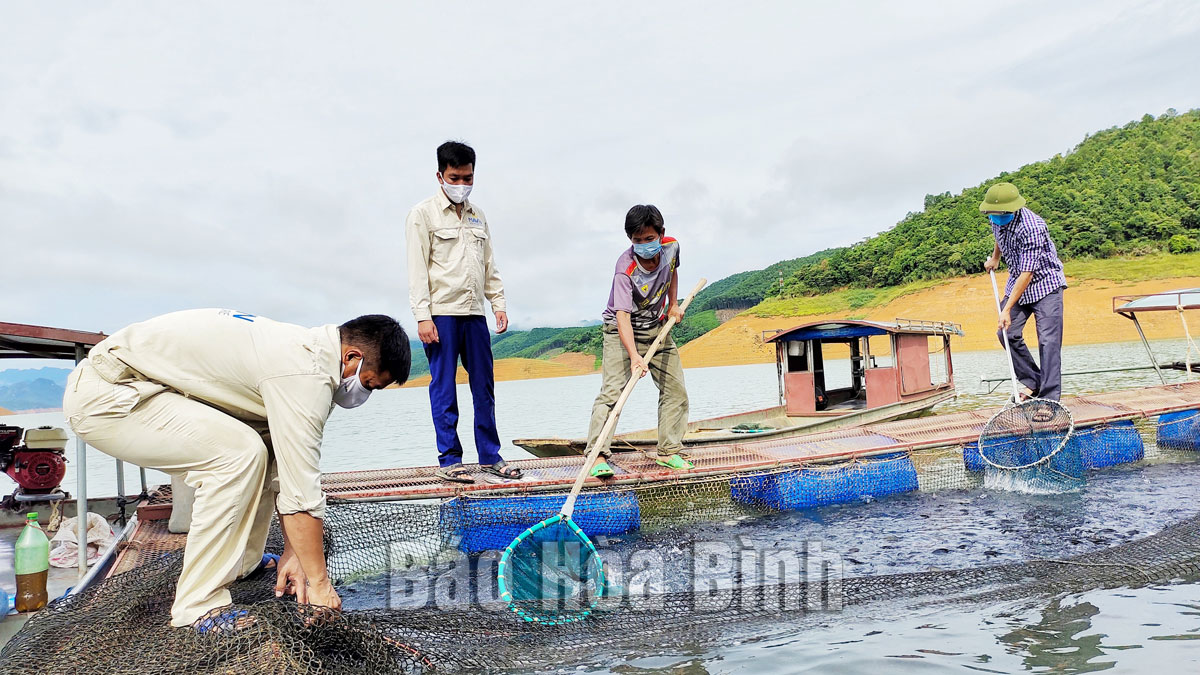
(HBO) - For many years, the release of fries is part of the efforts to protect, restore and develop aquatic product resources in Hoa Binh province, especially in the context that these resources are increasingly becoming depleted due to negative impacts from humans.

The provincial Fisheries
Sub-department cooperates with the Mavin Hoa BinhAquaculture Co., Ltd to
release fries in an effort to restore aquatic product resources in Cua Chuong
area in Hien Luong commune of Da Bac district.
Hoa Binh province has 2,700 ha of aquaculture with 4,700 fish cages, mainly
concentrating in Hoa Binh lake. The Hoa Binh lake area has nearly 8,900
ha of water surface, which is favourable for developing tourism and
aquaculture.
In
recent years, the fishing and aquaculture industry have brought stable incomes
for thousands of households in the lake's surrounding areas.
According to Hoang Van Son, Director of the provincial Fisheries
Sub-department, aquatic product resources in the locality and the Hoa Binh lake
area has been seriously reduced due to the destructive exploitation of local
people, such as using electric pulses, explosives and poisons to catch fish.
Amid the situation, local authorised agencies have stepped up communication
activities to raise public awareness, as well as inspection and handling of
violations to protect aquatic product resources.
In particular, every year, the sub-department organises the release of fries to
restore and develop aquatic product resources in the Hoa Binh lake.
In 2021, the agency coordinated with the Mavin Hoa BinhAquaculture Co.,
Ltd to release 65,000 fries in Cua Chuong area in Hien Luong commune of Da Bac
district.
The implementation of the pilot project to protect, regenerate and develop
aquatic product resources in the Da river basin and the Hoa Binh lake in the
period of 2020 – 2022 recorded remarkable results.
Training courses on the Fisheries Law and sub-law documents were organised.
Meanwhile, over 8,000 leaflets about the importance of protecting and restoring
aquatic product resources were distributed in the community, helping to raise
public awareness on this work.
Since 2020, 115,000 fries were released to the Da River hydropower reservoir
and other natural water areas. The fishing ban signs for a limited time are
also placed at natural spawning grounds. Communication activities on banning
the use of usingexplosivesandelectrical shocksto catch
fish have been organised.
The project has contributed to improving the living standards of households
around the Da River hydropower reservoir in particular and people in the
province in general./.
Hoa Binh province is undergoing a dynamic transformation amid Vietnam’s national digital transition. Building on Poliburo’s Resolution No. 57-NQ/TW on breakthroughs in science, technology, innovation, and national digital transformation, the province has rolled out a wide range of practical action plans. A standout initiative is the "Digital Literacy for All” movement, an effort to ensure that no one is left behind in the digital era.
Hoa Binh province is undergoing a dynamic transformation in the wake of the national digital transformation movement. Building on Resolution No. 57-NQ/TW of the Politburo on breakthroughs in science, technology, innovation, and national digital transformation, the province has implemented a wide range of practical action plans. A standout initiative is the "Digital Literacy for All” movement ambitious effort to ensure that no one is left behind in the digital age.
With a spirit of unity and proactive problem-solving, the Party Committee, the government and the people of Dong Lai Commune (Tan Lac District) have made great strides in implementing the resolutions of the 24th Party Congress of the commune for the 2020 - 2025 term. Focusing on leadership and practical actions, the commune has brought the Party’s resolutions into daily life, creating strong impacts and pushing the local development forward.
Amid the nationwide push for digital transformation, young people in Hoa Binh Province are stepping up as dynamic pioneers, applying technology to enhance Youth Union operations and expand the reach of youth-led initiatives. Through creativity and adaptability, Youth Union organizations at all levels have introduced a series of practical solutions, contributing to modern governance and community development.
In recent years, An Nghia commune, located in Lac Son district, has stepped up administrative reform, focusing on improving the quality and efficiency of its single-window service unit for receiving and processing administrative procedures. These improvements have helped create favourable conditions for local residents and organisations to handle administrative procedures, contributing to the commune’s broader socio-economic development.
The Prime Minister-approved master plan to develop the multi-use value of forests ecosystems through 2030, with a vision to 2050, aims to improve the management and sustainable use of forest resources, create jobs, increase incomes, and improve the living standards of ethnic minorities, people in mountainous and remote areas, forest workers and those living near forests.



